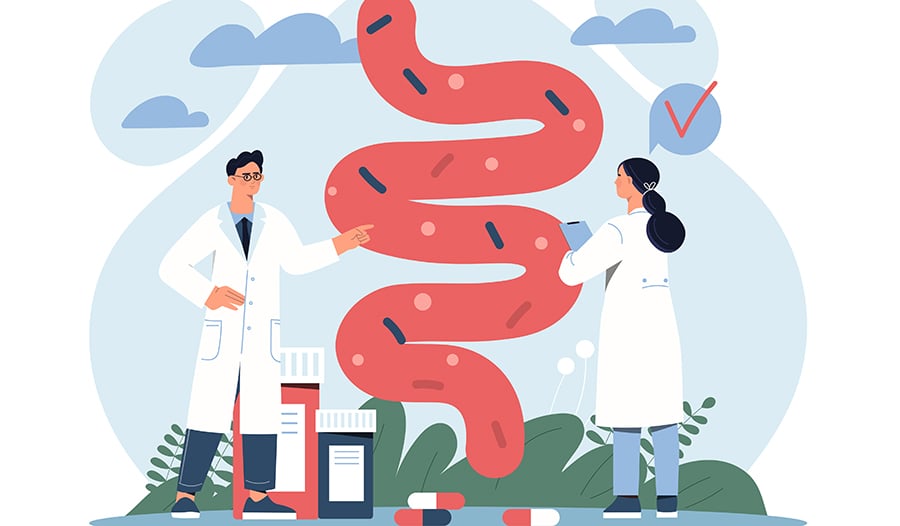Най-добри начини за естествено подобряване на здравето на червата: От регистриран диетолог

Темата за здравето на червата придобива все по-голяма популярност и за това има основателна причина! Здравето на червата ви играе решаваща роля за цялостното ви здраве. Самият Хипократ е казал, че "всички болести започват в червата". Да знаете как да поддържате здравето на червата си чрез хранителен режим и навици на живот е от съществено значение за предотвратяване и преодоляване на чревната дисбиоза.
Какво представлява чревният микробиом?
Чревният тракт, известен още като храносмилателен тракт или стомашно-чревен тракт, включва устата, хранопровода, стомаха, тънките черва, панкреаса, черния дроб, жлъчния мехур, дебелото черво и ректума: по същество всички части на тялото от устата до ануса, които участват в процеса на усвояване на хранителните вещества.
Чревният микробиом се състои от трилиони микроорганизми и бактерии, живеещи в чревния ви тракт. Червата съдържат както добри, така и лоши бактерии, известни като чревна флора. Тези бактерии играят решаваща роля за здравето и благосъстоянието и помагат за храносмилането на храната, усвояването на хранителните вещества и оказват влияние върху метаболизма, имунното здраве, хормоналното здраве, настроението, мозъчната функция, телесното тегло и др.
Защо здравето на червата е важно
По данни на Националния институт по здравеопазване (NIH) чревните заболявания засягат 60-70 милиона американци.1 В допълнение към приемането и усвояването на хранителните вещества червата служат и като борец с болестите и комуникатор в организма.
Остта черва-мозък свързва червата и мозъка. Чрез оста черва-мозък здравето на стомашно-чревния тракт оказва пряко влияние върху тревожността, настроението и нивата на стрес.2 Всъщност повече от 90 процента от серотонина, "хормона на щастието", се произвежда в червата.
Здравето на червата също оказва пряко влияние върху имунното здраве. Това е така, защото 70-80% от имунните клетки се намират в червата.3
Дисбиозата на червата също може да повлияе на хормоналния баланс. Например хормонът инсулин се регулира отчасти от Lactobacillus reuteri - бактерия, която се съхранява в червата. Освен това състоянието на червата може да повлияе на нивата на холестерола. Тъй като холестеролът е предшественик на прогестерона и естрогена, здравето на червата е важно за хормоналния баланс.
Следователно дисбалансът в чревния микробиом може да повлияе на имунното здраве, умственото и когнитивното здраве, теглото и хормоналното здраве.
Какво е чревна дисбиоза?
Дисбиоза на червата се появява, когато бактериите в чревния тракт не са балансирани. Ако не се лекува, чревната дисбиоза може да доведе до тревожност, депресия, пропускливи черва, автоимунни заболявания, диабет и др.4
Признаци и симптоми на чревна дисбиоза
Неоптималното състояние на червата може да увеличи риска от появата на следните симптоми:
- Хронична умора
- Запек
- Диария
- Болка или дискомфорт в стомаха
- Подуване на корема
- Газ
- Гадене
- Heartburn
- Хранителни алергии, непоносимост или чувствителност
- Кожни заболявания като екзема, розацея, обрив или дерматит
- Възпаление или възпалителни състояния
- Безпокойство
- Депресия
- Мозъчна мъгла
- Безсъние
- Главоболие
- Мигрена
- Хормонални смущения
- Автоимунни състояния
- Свръхрастеж на Candida
- Синдром на раздразненото дебело черво (IBS)
- Загуба на памет
- Дефицит на витамини
10 начина за естествено поддържане на здравето на червата
1. Яжте 30 растения седмично
Числото 30 идва от Американския проект за червата - най-големия в света проект за микробиома, който се осъществява от граждани. От това проучване научаваме, че колкото по-разнообразни растителни храни консумира човек, толкова по-разнообразен е неговият чревен микробиом. Консумирането на повече растения създава благоприятна среда за разнообразни здравословни чревни бактерии.
2. Яжте храни, които съдържат пребиотици
Пребиотиците са основна храна за пробиотиците и подпомагат растежа и живота на полезната, здравословна чревна флора. Пребиотичните храни включват бадеми, ябълки, банани, ленено семе. , чесън и лук: това са само някои от тях!
3. Яжте ферментирали храни
Ферментиралите храни съдържат пробиотици , които подпомагат поддържането на здравословни чревни бактерии. Ферментиралите храни включват кимчи, комбуча, мисо, кисело зеле, темпе и някои кисели млека.
4. Ограничете добавените захари
Внимавайте да не консумирате храни с високо съдържание на добавени захари. Захарта е възпалителна за организма и може да предизвика развитието на дрожди и лоши бактерии.5 Тъй като лошите бактерии обичат захарта и преработените храни, стремете се да сведете тези видове храни до минимум.
5. Подкрепа за здравето на зъбите
Устата ви е част от стомашно-чревния тракт! Добрата дентална хигиена е от съществено значение за доброто здраве на червата. Можете да поддържате зъбната хигиена, като остъргвате езика и използвате качествена паста за зъби. Прочетете списъците със съставки на пастата за зъби и избягвайте паста за зъби с изкуствени подсладители, триклозан и натриев лаурилсулфат.
6. Намаляване и управление на стреса
Стресът активира симпатиковата нервна система, която задейства реакцията "борба или бягство". Хроничното състояние на "борба или бягство" води до освобождаване на хормони като епинефрин (адреналин), които с течение на времето могат да окажат негативно влияние върху червата и да доведат до запек, диария, гадене или дисбаланс на чревните бактерии.2
Намерете начини да върнете тялото си в парасимпатиково състояние, за да може то да се включи в процеса на "почивка и храносмилане". Дейности като ходене, йога, медитация, акупунктура и дълбоко дишане са чудесни начини за успокояване на тялото и облекчаване на стреса.
7. Яжте повече полифеноли
Полифенолите са съединения, които се съдържат в растителните храни и са пълни с антиоксиданти. Полифенолите имат много ползи за здравето, включително положително въздействие върху здравето на червата. Яжте повече храни, които съдържат полифеноли, като червено грозде, бадеми, лук, зелен чай, боровинки, броколи, какао. и други!
8. Избягвайте изкуствените подсладители
Проучванията показват, че изкуствените подсладители, като ацесулфам калий, аспартам и захарин, могат да повлияят неблагоприятно на чревните бактерии и апетита. Винаги четете списъците със съставки, за да избегнете изкуствените подсладители в храните, напитките и дори в пастата за зъби!
9. Прекарвайте време сред природата
Прекарването на време сред природата: мислете за градинарство, пръст, туризъм, дървета, плаж и други: е чудесен начин да се ангажира парасимпатиковата нервна система, да се намали стресът, да се намали тревожността и на свой ред да се поддържа здравето на червата. Едно проучване установява, че при децата в предучилищна възраст, които прекарват постоянно време на открито в продължение на 10 седмици, се наблюдават промени в чревната микрофлора. Те също така са изпитвали по-малко стрес и са имали по-малко епизоди на гняв.6
Децата не са единствените, които могат да се възползват от престоя си сред природата! Много проучвания показват, че излагането на почвени микроби е от полза за хора от всички възрасти, тъй като помага за укрепване на имунната система и поддържа микробното разнообразие.
10. Упражнение
Проучванията показват, че физическите упражнения могат да увеличат микробното разнообразие и да подпомогнат растежа на полезните микробни видове в червата.7 Не забравяйте, че упражненията не означават само посещение на фитнес зала: разходката, градинарството, скачането на батут, танците в хола и плуването са чудесни начини да раздвижите тялото си и да поддържате здравето на червата.
8 храни, които поддържат здравето на червата
Храненето с храни, благоприятни за червата, е отличен начин за поддържане на здравето на червата и предотвратяване на чревната дисбиоза. От проекта "Американски черва" знаем, че консумирането на 30 или повече различни растителни храни седмично спомага за поддържане на бактериалното разнообразие в червата, което е от решаващо значение за цялостното им здраве. Растителните храни включват плодове, зеленчуци, ядки, семена, бобови растения, зърнени храни, билки, подправки и други.
В допълнение към консумацията на възможно най-много растения, включвайте ежедневно или ежеседмично следните благоприятни за червата храни:
1. Ябълков оцет
Ябълков оцет, или "ACV", е богата на пробиотици храна. Добавете една супена лъжица ACV към чаша вода с вместимост 8 унции и пийте преди хранене, за да подпомогнете храносмилането.
2. Авокадо
Мазнините омега-3 и фибрите в авокадото могат да стимулират микробното разнообразие, като същевременно осигуряват противовъзпалителни ползи.8
3. Джинджифил
Джинджифилът оказва много терапевтични ефекти върху храносмилателния тракт - от успокояване на стомашно разстройство до антиоксидантни и противовъзпалителни свойства. Пресният джинджифил е най-добър, но сушеният джинджифил се използва чудесно в сосове, печени рецепти, напитки и други!
4. Бобови растения
Бобът и лещата съдържат пребиотични фибри, които подпомагат растежа на добрата чревна флора. Черният боб, белият боб, нахутът, лещата и други са отлични варианти за растителни протеини и фибри!
5. Зехтин екстра върджин
Екстра върджин зехтинът е пълен със здравословни мазнини и антиоксиданти. Това е преобладаващият вид мазнина, използван в повечето сини зони - районите, в които хората живеят най-дълго и са най-здрави.
6. Бадеми
Според American Journal of Clinical Nutrition консумацията на бадеми увеличава производството на вид късоверижна мастна киселина, наречена бутират. Бутиратът не само поддържа здравето на червата. Като цяло той помага и за предпазване от някои възпалителни заболявания.
Традиционните бадеми са чудесни за лека закуска, като добавка към салати или овесени ядки, или като добавка към печени лакомства. Друг начин да се насладите на здравословните ползи от бадемите е като използвате брашно от бланширани бадеми за печене вместо традиционното брашно.
7. Сусамови семена
Със своето високо съдържание на фибри сусамовите семена могат да подобрят здравето на червата, като подпомагат растежа на здравословни чревни бактерии и насърчават редовното движение на червата.
8. Чесън
Чесънът е друга пребиотична храна, която поддържа здравословни чревни бактерии. Чесънът има и антимикробни свойства, които могат да помогнат за възпрепятстване на растежа на нездравословни бактерии. Както пресният чесън, така и чесънът на прах са отличен избор за супи, сосове и др.
Храни, които да избягваме, за да поддържаме здравето на червата
Някои храни могат да засилят възпаленията, да подпомогнат растежа на нездравословни бактерии и да не осигурят никакви хранителни ползи за организма извън приема на калории.9 За да поддържате здравето на червата, се стремете да намалите или да премахнете консумацията на следните продукти:
- Изкуствени подсладители
- Царевичен сироп с високо съдържание на фруктоза
- Алкохол
- Сода/меки напитки
- Напитки с високо съдържание на добавени захари
- Пържени храни
- Преработени храни
- Бързи храни
Вземане на храна
Здравето на червата ви е неразделна част от цялостното ви здраве. Здравето на червата влияе на имунната система, настроението, хормоналния баланс, телесното тегло и др. Така че поддържането на здрави черва оказва влияние далеч отвъд храносмилането.
Можете да предприемете много стъпки за естествено подобряване на здравето на червата си чрез ежедневните си диети, уелнес и начин на живот. Като следвате тези съвети, консумирате храни, благоприятни за червата, и избягвате храните, които водят до чревна дисбиоза, можете да се погрижите за здрави черва и здрави себе си!
Препратки:
- Национални институти по здравеопазване: Статистика за болестите на храносмилателната система в САЩ : https://www.niddk.nih.gov/health-information/health-statistics/digestive-diseases
- Wang, H., Lee, I., Braun, C. и Enck, P. (2016). Влияние на пробиотиците върху функциите на централната нервна система при животни и хора: Систематичен преглед. Journal of Neurogastroenterology and Motility, 22(4), pp.589-605.
- Wiertsema SP, van Bergenhenegouwen J, Garssen J, Knippels LMJ. Взаимодействието между чревния микробиом и имунната система в контекста на инфекциозните заболявания през целия живот и ролята на храненето за оптимизиране на стратегиите за лечение. Хранителни вещества. 2021;13(3):886. Публикувано 2021 март 9. doi:10.3390/nu13030886
- Sharma S, Tripathi P. Чревен микробиом и диабет тип 2: къде сме и накъде да вървим?. J Nutr Biochem. 2019;63:101-108. doi:10.1016/j.jnutbio.2018.10.003
- Foster JA, Rinaman L, Cryan JF. Стрес и усилвател; оста черва-мозък: Регулиране от микробиома. Neurobiol Stress. 2017;7:124-136. Публикувано 2017 Mar 19. doi:10.1016/j.ynstr.2017.03.001
- Sobko T, Liang S, Cheng WHG, Tun HM. Влияние на свързаните с природата дейности на открито върху чревната микрофлора, фекалния серотонин и възприетия стрес при деца в предучилищна възраст: рандомизирано контролирано проучване Play&Grow. Sci Rep. 2020;10(1):21993. Публикувано 2020 г., декември 15. doi:10.1038/s41598-020-78642-2
- Monda V, Villano I, Messina A, et al. Упражненията променят чревната микрофлора с положителен ефект върху здравето. Oxid Med Cell Longev. 2017;2017:3831972. doi:10.1155/2017/3831972
- Costantini L, Molinari R, Farinon B, Merendino N. Въздействие на омега-3 мастните киселини върху чревната микрофлора. Int J Mol Sci. 2017;18(12):2645. Публикувано 2017 Dec 7. doi:10.3390/ijms18122645
- Thursby E, Juge N. Въведение в човешката чревна микрофлора. Biochem J. 2017;474(11):1823-1836. Published 2017 May 16. doi:10.1042/BCJ20160510
ОТКАЗ ОТ ОТГОВОРНОСТ:Този УЕЛНЕС ХЪБ няма за цел да поставя диагнози...
















































































 Съдържание
Съдържание


